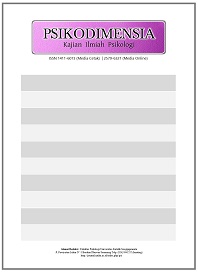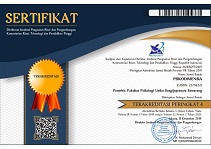Gratitude and Self-Regulation as Predictors of Fear of Missing Out among Generation Z in Indonesia
Abstract
Keywords
Full Text:
PDFReferences
Abel, J. P., Buff, C. L., & Burr, S. A. (2016). Social media and the fear of missing out: scale development and assessment. Journal of Business & Economics Research (JBER), 14(1), 33–44. https://doi.org/10.19030/jber.v14i1.9554
Akbari, M., Seydavi, M., Palmieri, S., Mansueto, G., Caselli, G., & Marcantonio. (2021). Fear of missing out (fomo) and internet use: A comprehensive systematic review and meta-analysis. Journal of Behavioral Addictions, 10(4), 879–900. https://doi.org/10.1556/2006.2021.00083
Allen, S. (2018). The science of gratitude. John Templeton Foundation.
Alutaybi, A., McAlaney, J., Arden-Close, E., Stefanidis, A., Phalp, K., & Ali, R. (2019). Fear of missing out (fomo) as really lived: five classifications and one ecology. 2019 6th International Conference on Behavioral, Economic and Socio-Cultural Computing (BESC), 1–6. https://doi.org/10.1109/BESC48373.2019.8963027
Amin, A., Zaman, K., Ashraf, M. Z., Khan, H., & Pervaiz, S. (2018). Gratitude & self esteem among college students. Journal of Psychology & Clinical Psychiatry, 9(4). https://doi.org/10.15406/jpcpy.2018.09.00546
APJII di Indonesia Digital Outlook. (2022). Asosiasi penyelenggara Jasa internet Indonesia. Accessed on May 23, 2023 at: https://apjii.or.id/berita/d/apjii-di-indonesia-digital-outloook-2022_857
Anastasya, Y. A., Hadiah, C. M., Amalia, I., & Suzanna, E. (2022). Correlation between fear of missing out and internet addiction in students. International Journal of Islamic Educational Psychology, 3(1). https://doi.org/10.18196/ijiep.v3i1.14038
Avcı, M. (2023). Belongingness, social connectedness, and life satisfaction in college students after covid-19 pandemic. Journal of Happiness and Health, 3(2), 23–36. https://doi.org/10.47602/johah.v3i2.43
Barron, R. L., & Kaye, L. K. (2020). Self-regulation strategies of smartphone use during university self-study. The Journal of Social Media for Learning Issue 1, 1(1), 41–61. https://doi.org/https://doi.org/10.24377/LJMU.jsml.vol1article381
Bartlett, M. Y., Valdesolo, P., & Arpin, S. N. (2020). The paradox of power: The relationship between self-esteem and gratitude. Journal of Social Psychology, 160(1), 27–38. https://doi.org/10.1080/00224545.2019.1601609
Brunborg, G. S., Skogen, J. C., & Burdzovic Andreas, J. (2022). Fear of missing out and binge-drinking among adolescents. Drug and Alcohol Review, 41(1), 230–237. https://doi.org/10.1111/dar.13356
Çikrikçi, Ö., & Gençdoğan, B. (2017). The effects of attachment styles and belongingness on life satisfaction among adolescents. International Journal of Happiness and Development, 3(3), 241. https://doi.org/10.1504/IJHD.2017.084073
Coskun, S., & Karayagız Muslu, G. (2019). Investigation of problematic mobile phones use and fear of missing out (fomo) level in adolescents. Community Mental Health Journal, 55(6), 1004–1014. https://doi.org/10.1007/s10597-019-00422-8
Dimock, M. (2019). Defining generations: Where millennials end and generation z begins. Pew Research Center, 17(1), 1–7. http://www.pewresearch.org/fact-tank/2019/01/17/where
Duli, N. (2019). Metode penelitian kuantitatif: Beberapa konsep dasar untuk penelitian skripsi data dengan spss. CV Budi Utama.
Elhai, J. D., Gallinari, E. F., Rozgonjuk, D., & Yang, H. (2020). Depression, anxiety and fear of missing out as correlates of social, non-social and problematic smartphone use. Addictive Behaviors, 105, 1–7. https://doi.org/10.1016/j.addbeh.2020.106335
Fagley, N. S. (2016). The construct of appreciation: It is so much more than gratitude. In Perspectives on Gratitude: An interdisciplinary approach. https://doi.org/10.4324/9781315736891
Franchina, V., Abeele, M. Vanden, van Rooij, A. J., Lo Coco, G., & De Marez, L. (2018). Fear of missing out as a predictor of problematic social media use and phubbing behavior among flemish adolescents. International Journal of Environmental Research and Public Health, 15(10), 1–18. https://doi.org/10.3390/ijerph15102319
Fuster, H., Chamarro Lusar, A., & Oberst, U. (2017). Fear of Missing Out, online social networking and mobile phone addiction: A latent profile approach. Aloma, 35(1), 23–30. http://recercat.cat/handle/2072/287864
Gentina, E. (2020). Generation Z in Asia: A Research Agenda. In The New Generation Z in Asia: Dynamics, Differences, Digitalisation (pp. 3–19). Emerald Publishing Limited. https://doi.org/10.1108/978-1-80043-220-820201002
Gestsdottir, S., Geldhof, G. J., Paus, T., Freund, A. M., Adalbjarnardottir, S., Lerner, J. V., & Lerner, R. M. (2015). Self-regulation among youth in four western cultures: Is there an adolescence-specific structure of the selection-optimization-compensation (soc) model? International Journal of Behavioral Development, 39(4), 346–358. https://doi.org/10.1177/0165025414542712
Gottlieb, R., & Froh, J. (2020). Gratitude and Happiness in Adolescents: A Qualitative Analysis. In Research Anthology on Rehabilitation Practices and Therapy. https://doi.org/10.4018/978-1-7998-3432-8.ch090
Gupta, M., & Sharma, A. (2021). Fear of missing out: A brief overview of origin, theoretical underpinnings and relationship with mental health. World Journal of Clinical Cases, 9(19), 4881–4889. https://doi.org/10.12998/wjcc.v9.i19.4881
Hanoum, M., Ekasari, A., Nurhidayah, S., & Pratistasari, F. (2022). The effect of extraversion personality and self-regulation on fear of missing out (fomo). In 1st Virtual Workshop on Writing Scientific Article for International Publication Indexed SCOPUS (pp. 558–564). Sciendo. https://doi.org/10.2478/9788366675827-097
Hathaway, L., & O’Shields, B. (2022). Understanding and engaging generation z. ACSM’s Health & Fitness Journal, 26(4). https://doi.org/10.1249/FIT.0000000000000774
Hlava, P., & Elfers, J. (2014). The lived experience of gratitude. Journal of Humanistic Psychology, 54(4), 434–455. https://doi.org/10.1177/0022167813508605
Homan, K., & Hosack, L. (2019). Gratitude and the self: Amplifying the good within. Journal of Human Behavior in the Social Environment, 29(7), 874–886. https://doi.org/10.1080/10911359.2019.1630345
Kargın, M., Türkben Polat, H., & Coşkun Şimşek, D. (2020). Evaluation of internet addiction and fear of missing out among nursing students. Perspectives in Psychiatric Care, 56(3), 1–6. https://doi.org/10.1111/ppc.12488
MacKenzie, M. J., & Baumeister, R. F. (2019). Motivated gratitude and the need to belong: Social exclusion increases gratitude for people low in trait entitlement. Motivation and Emotion, 43(3), 412–433. https://doi.org/10.1007/s11031-018-09749-3
Massey, B., Edwards, A. V., & Musikanski, L. (2021). Life satisfaction, affect, and belonging in older adults. Applied Research in Quality of Life, 16(3), 1205–1219. https://doi.org/10.1007/s11482-019-09804-2
McClelland M., Geldhof J., Morrison F., Gestsdóttir S., Cameron C., Bowers E., Duckworth A., Little T., & Grammer J. (2017). Self-Regulation in Handbook of Life Course Health Development. In Handbook of Life Course Health Development.
Mellor, D., Stokes, M., Firth, L., Hayashi, Y., & Cummins, R. (2008). Need for belonging, relationship satisfaction, loneliness, and life satisfaction. Personality and Individual Differences, 45(3), 213–218. https://doi.org/10.1016/j.paid.2008.03.020
Metin-Orta, İ. (2020). Fear of missing out, internet addiction and their relationship to psychological symptoms. Addicta: The Turkish Journal on Addictions, 7(1), 67–73. https://doi.org/10.15805/addicta.2020.7.1.0070
Milyavskaya, M., Saffran, M., Hope, N., & Koestner, R. (2018). Fear of missing out: prevalence, dynamics, and consequences of experiencing FOMO. Motivation and Emotion, 42(5), 725–737. https://doi.org/10.1007/s11031-018-9683-5
Muhtarom, T. (2022). How the impact of self regulation on fear of missing out (fomo) and internet addiction on elementary school pre service teacher students? Elementary School 9, 100–109.
Pichardo, C., Justicia, F., De La Fuente, J., Martínez-Vicente, J. M., & Berbén, A. B. G. (2014). Factor structure of the self-regulation questionnaire (srq) at spanish universities. Spanish Journal of Psychology, 17(2), 1–8. https://doi.org/10.1017/sjp.2014.63
Przybylski, A. K., Murayama, K., DeHaan, C. R., & Gladwell, V. (2013). Motivational, emotional, and behavioral correlates of fear of missing out. Computers in Human Behavior, 29(4), 1841–1848. https://doi.org/10.1016/j.chb.2013.02.014
Putri, A. I. D., & Halimah, L. (2019). Hubungan fomo (fear of missing out) dengan adiksi media sosial pada mahasiswa pengguna instagram di universitas islam badung. Prosiding Psikologi, 525–531. https://doi.org/http://dx.doi.org/10.29313/.v0i0.17131
Riordan, B. C., Flett, J. A. M., Cody, L. M., Conner, T. S., & Scarf, D. (2021). The fear of missing out (fomo) and event-specific drinking: The relationship between fomo and alcohol use, harm, and breath alcohol concentration during orientation week. Current Psychology, 40(8), 3691–3701. https://doi.org/10.1007/s12144-019-00318-6
Roberts, J. A., & David, M. E. (2020). The social media party: fear of missing out (fomo), social media intensity, connection, and well-being. International Journal of Human–Computer Interaction, 36(4), 386–392. https://doi.org/10.1080/10447318.2019.1646517
Rosyida, A., & Romadhani, R. K. (2022). Gratitude as a predictor of fear of missing out (fomo) among digital native generation in yogyakarta. Psychological Research and Intervention, 5(2), 53–62. https://doi.org/10.21831/pri.v5i2.60541
Rusdi, A., Sakinah, S., Bachry, P. N., Anindhita, N., & Hasibuan, M. A. I. (2021). The development and validation of the islamic gratitude scale (igs-10). Psikis : Jurnal Psikologi Islami, 7(2), 120–142. https://doi.org/10.19109/psikis.v7i2.7872
Sansone, R. A., & Sansone, L. A. (2010). Gratitude and well being: The benefits of appreciation. Psychiatry (Edgemont), 7(11).
Sianipar, N. A., Veronika, D., & Kaloeti, S. (2019). Hubungan antara regulasi diri dengan fear of missing out (fomo) pada mahasiswa tahun pertama fakultas psikologi universitas diponegoro. Jurnal Empati, 8(1), 136–143. https://doi.org/https://doi.org/10.14710/empati.2019.23587
Silvia, & Anna Appulembang, Y. (2022). Social comparison dengan fear of missing out pada remaja pengguna aktif media sosial. Jurnal Bimbingan Dan Konseling Ar-Rahman, 8(2), 171–178. https://doi.org/http://dx.doi.org/10.31602/jbkr.v8i2.8984
Sugiyono. (2022). Metode penelitian kuantitatif, kualitatif, dan r&d. Alfabeta.
Świątek, A. H., Szcześniak, M., & Bielecka, G. (2021). Trait anxiety and social media fatigue: Fear of missing out as a mediator. Psychology Research and Behavior Management, 14, 1499–1507. https://doi.org/10.2147/PRBM.S319379
Tanhan, F., Özok, H. İ., & Tayiz, V. (2022). Gelişmeleri kaçırma korkusu (fomo): Güncel bir derleme. Psikiyatride Güncel Yaklaşımlar, 14(1), 74–85. https://doi.org/10.18863/pgy.942431
Tiara, N., & Abdillah, R. (2024). Pengaruh regulasi diri terhadap fear of missing out (fomo) pada mahasiswa universitas bhayangkara jakarta raya. Jurnal Ilmiah Multidisiplin, 2(1), 818–827. https://doi.org/10.5281/zenodo.10685989
Tresnadiani, D., & Taufik, A. (2020). The development and validation of short self-regulation scale (ssr) on indonesian college students. Proceedings of the 5th International Seminar of Public Health and Education, ISPHE 2020, 126–135. https://doi.org/10.4108/eai.22-7-2020.2300264
Turner, A. (2015). Generation z: Technology and social interest. The Journal of Individual Psychology, 71(2), 103–113. https://doi.org/10.1353/jip.2015.0021
Wati, V. A., Pratikto, H., & Aristawati, A. R. (2022). Fear of missing out pada remaja di Surabaya: Bagaimana peranan regulasi diri? INNER: Journal of Psychological Research, 2(3), 297–303. https://aksiologi.org/index.php/inner/article/view/644
Yildirim, M., & Alanazi, Z. (2018). Gratitude and life satisfaction: Mediating role of perceived stress. International Journal of Psychological Studies, 10(3), 21. https://doi.org/10.5539/ijps.v10n3p21
Yin, L., Wang, P., Nie, J., Guo, J., Feng, J., & Lei, L. (2021). Social networking sites addiction and fomo: The mediating role of envy and the moderating role of need to belong. Current Psychology, 40(8), 3879–3887. https://doi.org/10.1007/s12144-019-00344-4
Yusra, A. M., & Napitupulu, L. (2022). Hubungan regulasi diri dengan fear of missing out (fomo) pada mahasiswa. Journal of Islamic and Contemporary Psychology, 2(2). https://doi.org/https://doi.org/10.25299/jicop.v2i2.8718
DOI: https://doi.org/10.24167/psidim.v23i1.11979
Print ISSN : 1411-6073 | online ISSN : 2579-6321 View My Stats

This work is licensed under a Creative Commons Attribution 4.0 International License.





















